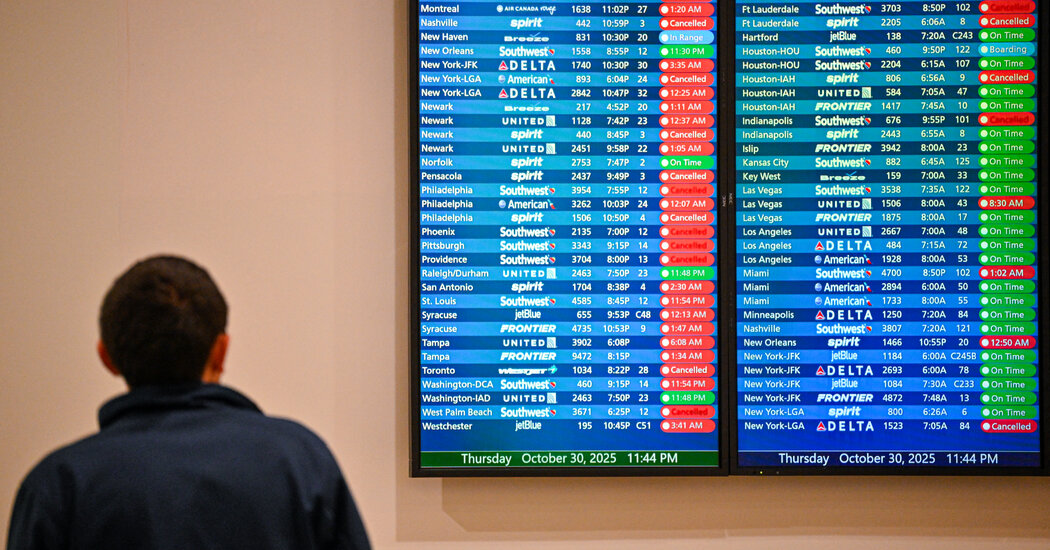A shortage of air traffic controllers, who are working without pay during the government shutdown, set off a cascade of delays at airports across the United States on Friday evening.
The Federal Aviation Administration reported understaffing at 35 facilities, including airports and other facilities that handle air traffic on Friday. On the same day, the head of the air traffic controllers’ union, which has rejected the idea that the lack of pay was causing disruptions, called for Congress to pass a continuing resolution to reopen the government, effectively endorsing congressional Republicans’ approach.
By evening, the F.A.A. had reported the staffing shortage had caused significant delays for flights departing to all three major airports serving the New York City area, as well as those bound for major airports in Boston, Dallas, Houston, Nashville, Phoenix, San Francisco, and Washington, D.C. In some locations, including LaGuardia Airport and John F. Kennedy International Airport, the average delay for arrivals was longer than two hours. The shortage was also affecting facilities that handle air traffic control between airports and in areas with multiple airports.
The widespread disruptions followed a chaotic night of air travel on Thursday, when the F.A.A. stated that no certified controllers were expected to show up for the evening shift at Orlando International Airport, forcing the agency to take contingency measures that caused spillover delays at airports along the East Coast.
The growing problems unfolded just days after the controllers missed their first full paycheck because of the shutdown, after receiving a partial paycheck two weeks ago. The missed pay period appeared to prompt the union representing controllers to take the rare step of endorsing one party’s preferred approach to ending the impasse.
“Congress must pass a clean continuing resolution (CR) to immediately end the government shutdown, ensure that all individuals who have not been paid during this prolonged closure receive their compensation, and then engage in bipartisan negotiations on other pressing issues facing our nation,” Nick Daniels, the president of the National Air Traffic Controllers Association, said in a statement Friday afternoon.
While Republicans have been pushing to pass a “clean” continuing resolution to end the shutdown, Democrats have insisted that any bill to reopen the government include an extension of subsidies for people who purchase health insurance on public exchanges, to keep costs to consumers from rising significantly.
The F.A.A.’s work force of about 11,000 certified air traffic controllers is caught up in the fight over the federal government shutdown, now the second-longest on record and entering its second month.
Senior Trump administration officials have repeatedly highlighted the plight of controllers, who were already working overtime shifts to make up for severe staffing shortages before the shutdown began, and have gone unpaid for weeks even as they are required to continue showing up to work. That combination, officials said, has left many strapped for cash and forced to take on side jobs to make ends meet, particularly since Tuesday, their first full missed payday.
On Thursday, Vice President JD Vance and Transportation Secretary Sean Duffy warned that flight delays would increase and that passengers’ ability to reach their destinations would become more tenuous if the shutdown continued into November, when holiday travel picks up. Those comments came two days after the head of the air traffic controllers’ union said the stresses on his members were making the nation’s air travel system “less safe.”
The coming seasonal increase in flights and the onset of wintry weather would put additional stressors on the already overtaxed controllers at the same time as the financial crunch of the shutdown would become untenable for them, officials said. Mr. Duffy has said on multiple occasions this week that while some controllers may have enough savings to weather one missed paycheck, few would have the resources to get through a second missed check.
Controllers took their message to the public this week, fanning out over a number of major airports to distribute leaflets encouraging travelers to press their congressional representatives for an end to the impasse. Mr. Daniels, who has made joint appearances with Mr. Duffy this month, has rejected suggestions that controllers would take matters into their own hands by refusing to show up for work, stressing that such collective action would be illegal.
The F.A.A. imposes flight restrictions when air traffic facilities hit “staffing triggers” — thresholds at which the agency considers control towers to be insufficiently staffed to meet the needs of previously scheduled traffic. Because the F.A.A. currently has about 3,000 vacant controller positions, many towers operate very close to the margin of a staffing trigger. That means that any unexpected absence — whether because of illness, or a concern specific to the shutdown — can force the agency to slow or stop traffic, resulting in compound delays.
While the F.A.A. has not published a reason for Friday’s absences, experts said the spread of the delays appeared to be organic.
“The impact is growing over time with more ground delay programs due to staffing,” said Michael McCormick, a professor of air traffic management at Embry‑Riddle Aeronautical University. “But I do not see any signs of organized activity for a slowdown.”
Karoun Demirjian is a breaking news reporter for The Times.
Christine Chung is a Times reporter covering airlines and consumer travel.
The post Staff Shortages at 35 Air Traffic Control Sites Disrupt Travel appeared first on New York Times.




